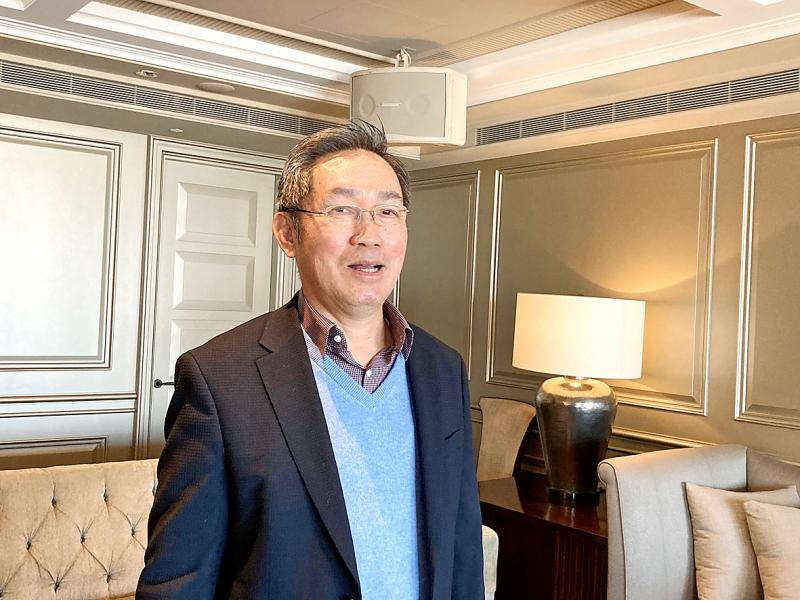Vanguard International Semiconductor Co (世界先進) yesterday said it is seeking new merger-and-acquisition (M&A) opportunities and other ways to expand capacity, as increasing 5G smartphone penetration and a pick-up in the automotive sector are fueling demand for its chips.
The company is also counting on a rebound in the global economy, which is forecast to grow 5 percent this year after contracting by an estimated 4 percent last year, amid optimism that the COVID-19 pandemic would be tamed as vaccinations spread, it said.
Vanguard, which makes power management chips and driver ICs for flat panels, is feeling the robust demand.

Photo: Lisa Wang, Taipei Times
The chipmaker said its factories are already running at full capacity and are unable to fill some customers’ demand.
It has recently implemented a new pricing scheme, charging higher prices if customers want to secure additional capacity that still needs to be built.
“Demand for 8-inch wafers is pretty strong, mainly driven by the work-from-home, remote learning and stay-at-home entertainment trends, amid the pandemic,” company chairman Fang Leuh (方略) told reporters during the year-end media gathering in Taipei.
Demand for driver ICs for flat panels used in TVs, notebooks and other devices are all on the rise, causing widespread supply constraints, Fang said.
Overall, the demand for power management chips outpaces supply by more than 10 percent, estimates by some industry researchers showed.
“Vanguard will continue to invest in new capacity expansion to support customers’ demand and growth,” Fang said. “Seeking a merger-and-acquisition deal is a direction the management is looking at.”
Aside from M&As, Vanguard plans to add a capacity of 10,000 8-inch wafers at its Singapore fab this year and is also considering boosting the capacity of a local fab.
A run-up in the penetration rate of 5G smartphones this year is giving a further boost to semiconductor demand, Fang said.
Globally, 5G smartphones are forecast to account for 37 percent of forecast smartphone shipments of 1.36 billion units this year, compared with 19 percent last year, TrendForce Corp (集邦科技) said.
A 5G smartphone uses 1.5 times more power management chips than a 4G phone, according to Vanguard’s calculation.
A recovering auto industry is also driving demand for power management chips, thanks to higher semiconductor content per vehicle, Fang said.
A new vehicle is equipped with US$607 of semiconductors, up more than 15 percent from US$523 last year, he said, citing statistics from an unspecified research house.
Auto shipments are forecast to increase about 7 percent annually to 77 million vehicles this year from 72 million last year, he added.
To fund the expansion, Vanguard said it is to raise capital spending this year from last year’s budget of NT$3.6 billion.

Real estate agent and property developer JSL Construction & Development Co (愛山林) led the average compensation rankings among companies listed on the Taiwan Stock Exchange (TWSE) last year, while contract chipmaker Taiwan Semiconductor Manufacturing Co (TSMC, 台積電) finished 14th. JSL Construction paid its employees total average compensation of NT$4.78 million (US$159,701), down 13.5 percent from a year earlier, but still ahead of the most profitable listed tech giants, including TSMC, TWSE data showed. Last year, the average compensation (which includes salary, overtime, bonuses and allowances) paid by TSMC rose 21.6 percent to reach about NT$3.33 million, lifting its ranking by 10 notches

Popular vape brands such as Geek Bar might get more expensive in the US — if you can find them at all. Shipments of vapes from China to the US ground to a near halt last month from a year ago, official data showed, hit by US President Donald Trump’s tariffs and a crackdown on unauthorized e-cigarettes in the world’s biggest market for smoking alternatives. That includes Geek Bar, a brand of flavored vapes that is not authorized to sell in the US, but which had been widely available due to porous import controls. One retailer, who asked not to be named, because

SEASONAL WEAKNESS: The combined revenue of the top 10 foundries fell 5.4%, but rush orders and China’s subsidies partially offset slowing demand Taiwan Semiconductor Manufacturing Co (TSMC, 台積電) further solidified its dominance in the global wafer foundry business in the first quarter of this year, remaining far ahead of its closest rival, Samsung Electronics Co, TrendForce Corp (集邦科技) said yesterday. TSMC posted US$25.52 billion in sales in the January-to-March period, down 5 percent from the previous quarter, but its market share rose from 67.1 percent the previous quarter to 67.6 percent, TrendForce said in a report. While smartphone-related wafer shipments declined in the first quarter due to seasonal factors, solid demand for artificial intelligence (AI) and high-performance computing (HPC) devices and urgent TV-related orders

Prices of gasoline and diesel products at domestic fuel stations are this week to rise NT$0.2 and NT$0.3 per liter respectively, after international crude oil prices increased last week, CPC Corp, Taiwan (台灣中油) and Formosa Petrochemical Corp (台塑石化) said yesterday. International crude oil prices last week snapped a two-week losing streak as the geopolitical situation between Russia and Ukraine turned increasingly tense, CPC said in a statement. News that some oil production facilities in Alberta, Canada, were shut down due to wildfires and that US-Iran nuclear talks made no progress also helped push oil prices to a significant weekly gain, Formosa said